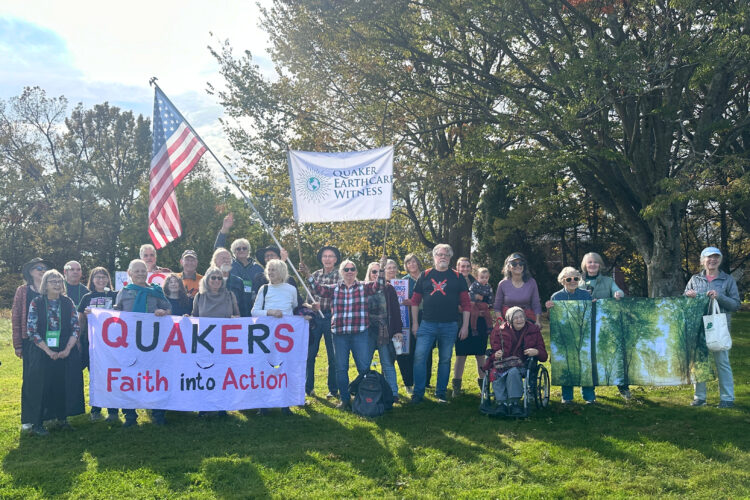Simplicity: A Call to Return to Unity and Harmony With Earth and Its Inhabitants

Simplicity: A Call to Return to Unity and Harmony With Earth and Its Inhabitants
By SJM and Lee Hall
Climate Action Committee, Radnor Quaker Meeting
It’s often said that it takes more muscles to frown than to smile. There is an inherent simplicity and ease in smiling. To love, likewise, is simpler than to create distractions from love. Peace, too, is the simple way. Simpler than war, simpler than hate, simpler than the endless desire to dominate that humanity so often displays.
In a world entangled with complex human systems that introduce increasing levels of chaos into our lives, it’s simplicity that offers an appealing path forward. There is wisdom in simplicity, and it calls us to live a life aligned with it.
Instead of structuring our society on tiered systems of wealth or clout, simplicity calls us to seek out ways of living in harmony with our planet and all who inhabit it. We’re interconnected – not only as members of our communities, but also as part of Earth’s broader ecosystem. Our individual and collective actions impact not only our immediate lives and communities, but our planet as a whole. Consumerism – the quest for the newest, the best, the most – diminishes planetary resources while simultaneously increasing pollution and global warming. It also oppresses communities around the globe who struggle under the pressure of exploitative economic systems that prioritize profits over people.
“The Earth is what we all have in common.” That’s Wendell Berry, the farmer and author, speaking to finding unity in the power of each other and our Earth. We are interdependent; no one is complete apart from the rest. How often and how deeply do we acknowledge our beautiful, sacred connections?
Buildings may crumble into the rising seas or human wars. Yet nature endures – a powerful force striving always to regenerate and heal. When we side with the power of nature, the effects can be impressive. One vivid example is the resilience of mangrove forests. After deforestation, corridors of mangroves along a river can regenerate fully within mere decades. This is a testament to the Earth’s ability to renew and heal itself. When we listen closely, we hear Earth calling us to follow its lead and do the same in our communities.
Continuing Revelation
We have come to understand the importance of native gardening. We appreciate all that happens when nature thrives on its own terms.
And we have come to understand that some people are not to be owned, controlled, resocialized, or exterminated by others. We now know the Doctrine of Discovery was a profound mistake, advanced by European settlers who misused religion to justify it. Continuing revelation brought us to understand and support reparations for those our ancestors have exploited.
Will we similarly come to rue humanity’s systematic exploitation of living communities beyond our species? Given that we have no biological need for this habit, is it, too, relinquishable? Imagine how different, how much freer, our living Earth would be if we stopped chasing, confining, and commercializing other beings—and if we simply grew food, not feed. This would support a resurgence of biodiversity and help us coexist with Earth’s climate system. It would also relieve some of the least privileged among us from the work of repetitive killing, along with the resultant injuries and traumatic stress.
As inhabitants of Earth, we are given a sacred calling – to sustain our world and all its living beings. As Earth itself teaches us, the best approach is not domination, but simplicity.
We’re part of this society, yet also of Earth’s web of life. We imagine how much better we could be at sensing this, and how soon the results could be observable, and what a relief it would be to see the transformation.
We imagine the type of world we could inhabit if we, both environmentally and socially, truly embraced simplicity, solidarity, and love. By treating all living communities and our planetary systems with respect, we could foster societies where division, war, and strife are replaced by peace. For peace is a principle that promotes love over division, and solidarity over hierarchy.
We thank you so much for reading this far, and look forward to connecting with those who feel called to contribute to the urgent work of our time. Our Climate Action Committee is advancing dialogue to inspire actionable commitments to a more sustainable and equitable humanity. We’re eager to explore our transformative potential together.

